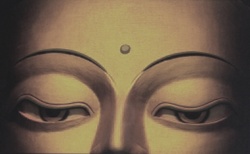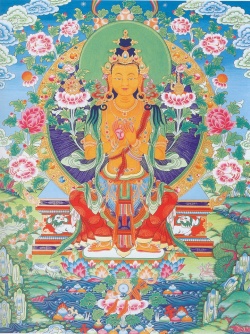Difference between revisions of "The Pleasure Of Brahmas"
| Line 1: | Line 1: | ||
| − | {{DisplayImages|1778|1133 | + | {{DisplayImages|1778|1133}} |
<poem> | <poem> | ||
[[Brahmas]] are [[very peaceful]] [[beings]]; they enjoy the [[tranquility]] of [[jhana]] [[kusala]] they had performed previously to gain the [[Brahma realm]]. They are [[reborn]] as [[Brahmas]] only after [[attaining]] [[jhana]]; and for this they had to [[meditate]] in [[solitude]] in quite places away from the crowded cities, villages, [[monasteries]], remote from the throngs of {{Wiki|society}} and the [[worldly]] [[sensual pleasures]]. [[Brahmas]] have no spouses, no children. They have no {{Wiki|sexual}} features so they do not enjoy the [[pleasures]] of [[kamma guna]]. They had clearly seen the faults of [[sensual pleasures]] even during their [[meditation]] period as [[human being]]. So they live a very [[pure]] [[life]], free from all [[thoughts]] of [[sensual pleasures]]. | [[Brahmas]] are [[very peaceful]] [[beings]]; they enjoy the [[tranquility]] of [[jhana]] [[kusala]] they had performed previously to gain the [[Brahma realm]]. They are [[reborn]] as [[Brahmas]] only after [[attaining]] [[jhana]]; and for this they had to [[meditate]] in [[solitude]] in quite places away from the crowded cities, villages, [[monasteries]], remote from the throngs of {{Wiki|society}} and the [[worldly]] [[sensual pleasures]]. [[Brahmas]] have no spouses, no children. They have no {{Wiki|sexual}} features so they do not enjoy the [[pleasures]] of [[kamma guna]]. They had clearly seen the faults of [[sensual pleasures]] even during their [[meditation]] period as [[human being]]. So they live a very [[pure]] [[life]], free from all [[thoughts]] of [[sensual pleasures]]. | ||
Latest revision as of 08:40, 3 April 2014
Brahmas are very peaceful beings; they enjoy the tranquility of jhana kusala they had performed previously to gain the Brahma realm. They are reborn as Brahmas only after attaining jhana; and for this they had to meditate in solitude in quite places away from the crowded cities, villages, monasteries, remote from the throngs of society and the worldly sensual pleasures. Brahmas have no spouses, no children. They have no sexual features so they do not enjoy the pleasures of kamma guna. They had clearly seen the faults of sensual pleasures even during their meditation period as human being. So they live a very pure life, free from all thoughts of sensual pleasures.
In their divine places and gardens, all Brahmas live in serenity, in saintliness. Some enjoy their jhana bliss while some develop mettá bhávaná radiating waves of loving-kindness. Like in the human world there are different grades of Brahmas. There are Brahma kings, Brahma purohita (advisors or counselors) and lower grade of Brahmas who form the retinue in attendance to the king. Lower Brahmas cannot see the Brahma king without his consent.
1. Asannasatta Brahmas
Asannasatta Brahmas are those divine beings without any consciousness or mind. As human beings they discover the faults of citta (mind) and sañña (memory). They see that all forms of greed arises because of citta, they also see that life would be so peaceful had there been no citta. While concentrating on the fault of consciousness, "Citta is loathsome. Citta is loathsome", they develop a kammatthana called sannaviraga bhávaná - disgust for sañña.
When they die they are reborn as Brahmas, in the Asannasatta Brahma realms and live like golden statues, standing, sitting or reclining without consciousness. Their life span is 500 kappa’s long.
2. Arupa Brahmas
Arupa Brahmas have no rupa; they have consciousness only. In the human world they worked for attainment of jhana; after that they concentrate on the faults of rupa; they see that the rupa is the seat of suffering. Then they develop [[rupa viraga bhávaná[[ - disgust for rupa. When they die they become Arupa Brahmas, beings without material form in the open space called Arupa Brahma realm. They live as continuous of consciousness high in the heavens for many kappa’s.
Note:
Non-Buddhists will find it hard to believe in these two types of Brahmas.
From Brahma to Hog
Of the Brahmas born in the Brahma realm, the Ariya Brahmas (who have achieved Magga and Phala) will not go downwards to the lower realms. They soar higher, become Arahats and realized Nibbána. But for Brahmas, who not yet Ariyas, they will have to descend to either Deva or human abode at the exhaustion of their jhana power. But they will not fall directly into the woeful planes. Due to their past kusala they become Devas or humans of dvihetuka or tihetuka category in the next life. From these planes they, according to their own actions, may fall into the four Apaya existences and become animals, petas or sinners in hell.
In the cycle of samsara, ordinary worldly beings puthujana persons, although they reach the highest abode of Brahmas are liable to fall into bad, lower planes, such as animal kingdom. There is a saying, "Once a radiant Brahma; next a filthy hog." Being a puthujjana is very dreadful state. From Bhavagga, the highest Brahmas realm, you might one day fall to the woeful planes. A rocket, missile or a projectile will soar skywards as long as there is propulsive energy; once the energy is spent, it must fall down again. So also sentient beings, at the exhaustion of their jhana power must return to the lower abodes.

